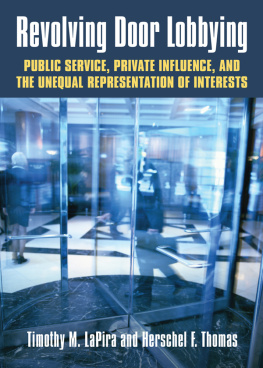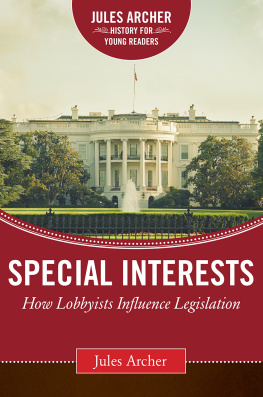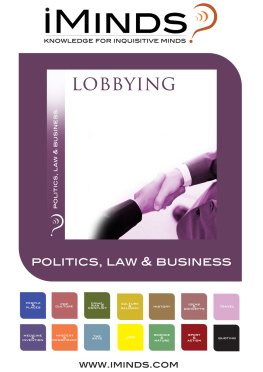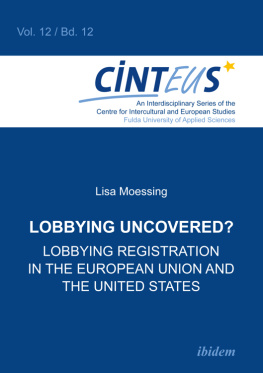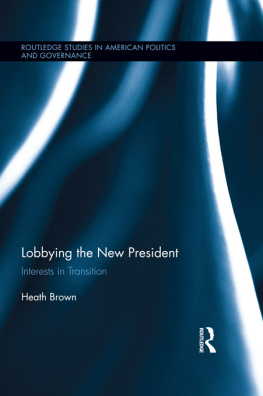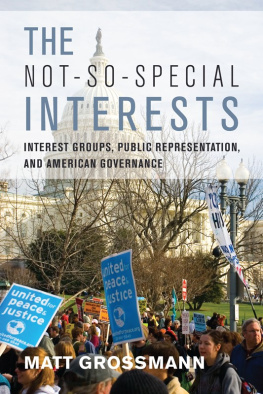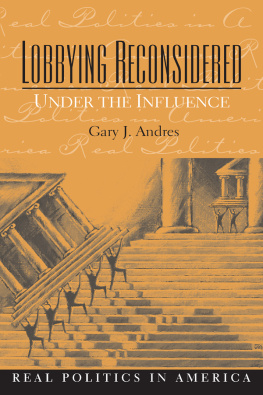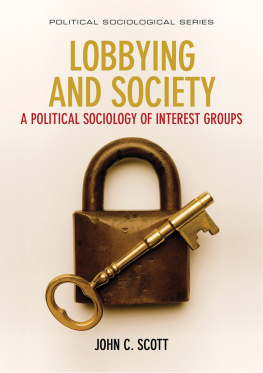2017 by the University Press of Kansas
All rights reserved
Published by the University Press of Kansas (Lawrence, Kansas 66045), which was organized by the Kansas Board of Regents and is operated and funded by Emporia State University, Fort Hays State University, Kansas State University, Pittsburg State University, the University of Kansas, and Wichita State University
Library of Congress Cataloging-in-Publication Data
Names: LaPira, Timothy M. | Thomas, Herschel F.
Title: Revolving door lobbying : public service, private influence, and the unequal representation of interests / Timothy M. LaPira and Herschel F. Thomas.
Description: Lawrence : University Press of Kansas, [2017] | Series: Studies in government and public policy | Includes bibliographical references and index.
Identifiers: LCCN 2016056648
ISBN 9780700624508 (cloth : alk. paper)
ISBN 9780700624515 (ebook)
Subjects: LCSH: LobbyistsUnited States. | LobbyingUnited States. |Pressure groupsUnited States. | Civil serviceUnited States.
Classification: LCC JK1118 .P57 2017 | DDC 328.73/078dc23
LC record available at https://lccn.loc.gov/2016056648.
British Library Cataloguing-in-Publication Data is available.
Printed in the United States of America
10987654321
The paper used in this publication is recycled and contains 30 percent postconsumer waste. It is acid free and meets the minimum requirements of the American National Standard for Permanence of Paper for Printed Library Materials Z39.48-1992.
ACKNOWLEDGMENTS
While working on the umpteenth revision of a manuscript for resubmission to a journal with our colleague Frank Baumgartner, one of the last of hundreds (thousands?) of e-mails between us, somebody threw out the question, Hey, wouldnt it be great if we had more than just a dummy variable for this revolving door thing? This book is the answer to that question. We hope it is a good one.
In truth, the genesis of this project was when the two authors met in 2007 at a conference at Penn State, hosted by Baumgartner. LaPira was then at the Center for Responsive Politics, trying to find time to finish up his dissertation. Thomas was an undergraduate, on the cusp of applying to graduate school to start his. Everything that we have accomplished since is the result of the guidance of our mentors, Baumgartner, Beth Leech, and Bryan Jones. Their names are not listed as authors on the cover, but their intellectual imprint can be found on every page.
Of course, these pages would not have been written to begin with without the generous financial support of our funders. We are grateful for the American Political Science Associations Small Research Grant program and the Dirksen Congressional Centers Congressional Research Grant program for supporting travel to Washington to conduct interviews. In addition, LaPira appreciates financial support from the James Madison University College of Arts and Letters for a summer research stipend and a much-needed leave in spring 2016 to complete the book. He is also indebted to the JMU Department of Political Science for a Mr. and Mrs. Claiborne Johnston Jr. Endowment award. While working on the project as a graduate student, Thomas benefited from financial support from the University of Texas at Austins Graduate School, J. J. Pickle Chair, and the Department of Government. As a new faculty member, Thomas appreciates the generous research support provided by the College of the Liberal Arts and the Department of Political Science at the University of Texas at Arlington.
The data we collected for this project relied on the hard work and generosity of many people, probably more than we recall here. We thank all those at the Center for Responsive Politics for their tireless efforts to help citizens, journalists, and academics Count Cash and Make Change. Our democracy is better off for the work they do. This book is especially better off from the direct assistance we had from Jihan Andoni, Dan Auble,
Sarah Bryner, and Sheila Krumholz. That was just the start. Without the help from some truly amazing undergraduate assistantsmany of whom have now moved on to launch their own successful careers in Washington, where they are poised to spin through the revolving door themselvesthis book simply would not have been written. We thank Hannah Aiken, Joshua Althouse, Carter Black, Meredith Gray, Zuleika Lim, Gwen Murtha, Amy Roberts, David Scala, Matt Silver, Heather Smith, and Rachel Wein at JMU and Alyssa Aquino, Courtney Pool, and Nalah Williams at the University of Texas at Arlington. We also are indebted to Robert Shaffer, who helped us develop a much-needed Python script to extract data from lobbying disclosure reports. And we appreciate how generously and quickly our colleagues shared data for us to use and/or replicate in this book, including Lee Drutman and Alexander Furnas, Scott Adler and John Wilkerson, Craig Volden and Alan Wiseman, and Jeff Lazarus, Amy McKay, and Lindsey Herbel.
We have also been fortunate to gain valuable feedback from colleagues at various stages of the project that vastly improved the outcome. Parts of the book benefited from feedback from colleagues at two American Political Science Association conferences, two Midwest Political Science Association meetings, one Southern Political Science Association meeting, and one European Consortium for Political Research general conference. We also profited from invited talks at Rutgers University, the University of Oklahoma, the University of Texas at Austin, the Sunlight Foundation, the Congressional Research Service, and the Conference on Lobbying Reform in the United States and the European Union hosted by our friend and colleague Jim Thurber at American University. Baumgartner, Leech, Jones, Drutman, Adler, Jacob Straus, Marie Hojnacki, Patrick Bernhagen, Michael Heaney, Matt Grossmann, and Adam Sheingate all read earlier versions of something that ended up here, including everything from draft codebooks in the beginning to significant portions of the book at the end. Their careful reading and detailed comments helped us realize what we were actually trying to say. Bird Loomis has been an enormous influence as our editor on related projects that helped us improve this one. And of course, Chuck Myersa former lobbyist himselfwas an incredibly patient and helpful editor at the University Press of Kansas who walked us through the process and provided us valuable insight to make this book as readable as we could. It should go without saying that we are solely to blame for whennot ifit is not so readable.
Over the course of two years, we conducted original interviews with experts and lobbyists in Washington to compile personal anecdotes, reflections, and experiences that help put our quantitative analyses in a real-world
context. Though our institutional review board protocol prevents us from revealing who they are, we hope they all know how grateful we are for their time and insights that contributed invaluably to our project. All told, we interviewed dozens of lobbyist headhunters, political law attorneys, open government and lobbying reform activists, journalists who cover the business of lobbying in Washington, major corporate and association government affairs lobbyists, and lobbying firm managers. We are particularly indebted to the two lobbyists who unwittingly serve as the main characters in our story: the K Street Kingpin and the Librarian are not merely literary devices. They are dedicated, honest, hard-working, and genuinely enjoyable people who deserve our full-throated thank you. Thank you!

